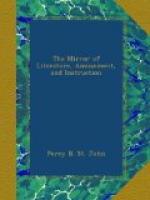CRANIOLOGY.
On a celebrated craniologist visiting the studio of a celebrated sculptor in London, his attention was drawn to a bust with a remarkable depth of skull from the forehead to the occiput. “What a noble head,” he exclaimed, “is that! full seven inches! What superior powers of mind must he be endowed with, who possesses such a head as is here represented!” “Why, yes,” says the blunt artist, “he certainly was a very extraordinary man—that is the bust of my early friend and first patron, John Horne Tooke.” “Ay,” answers the craniologist, “you see there is something after all in our science, notwithstanding the scoffs of many of your countrymen.” “Certainly,” says the sculptor; “but here is another bust, with a greater depth and a still more capacious forehead.” “Bless me!” exclaims the craniologist, taking out his rule, “eight inches! who can this be? this is indeed a head—in this there can be no mistake; what depth of intellect, what profundity of thought, must reside in that skull! this I am sure must belong to some extraordinary and well-known character.” “Why, yes,” says the sculptor, “he is pretty well known—it is the head of Lord Pomfret.”
* * * * *
PRYNNE.
Anthony A’Wood has informed us that when Prynne studied, “his custom was to put on a long quilted cap, which came an inch over his eyes, serving as an umbrella to defend them from too much light, and seldom eating any dinner. He would be every three hours munching a roll of bread, and now and then refresh his exhausted spirits with ale.”
* * * * *
GERMAN STUDENTS.
The German students are a set of young men who certainly pursue their studies with zeal, but who nevertheless are more brutal in conduct, more insolent in manner, more slovenly and ruffian-like in appearance, and more offensive from the fumes of tobacco and beer, onions and sourcrout, in which they are enveloped, than are to be met with in any other part of Europe. In a small town of a small state a German university is a horrible nuisance; and how the elegant court of Weimar, in particular, can tolerate the existence of one within an hour’s ride of its palace, where we have seen ragamuffins fighting with broad-swords in the market-place, moves “our special wonder.” To the university of Bonn is attached a rich collection of subjects in natural history, and a botanical garden; and such is its success, from the celebrity of its professors, among whom is numbered the illustrious William Schlegel, that, Dr. Granville states, “there are at this time about one thousand and twenty students who, for twenty pounds in university and professors’ fees, and forty more for living, get a first-rate education.” The climate and the situation on the banks of the Rhine are most inviting; and a beautiful avenue of chestnut trees, nearly a mile in length, joins the castle of Popplesdorf, which contains the cabinets of natural history, with the university.




